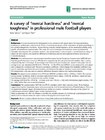A survey of 'mental hardiness' and 'mental toughness' in professional male football players

Abstract
Background: It is not uncommon for chiropractors to be associated with sports teams for injury prevention,
treatment, or performance enhancement. There is increasing acceptance of the importance of sports psychology in
the overall management of athletes. Recent findings indicate mental hardiness can be determined reliably using
specific self-assessment questionnaires. This study set out to investigate the hardiness scores of professional
footballers and examine the correlation between two questionnaires. It also included a mental hardiness rating of
players by two coaches, and examined differences in hardiness and mental toughness between national and
international players.
Methods: Two self-assessment questionnaires (modified Sports Mental Toughness Questionnaire [SMTQ-M] and
Psychological Performance Inventory [PPI-A]) were completed by 20 male professional footballers. Two coaches,
independently rated each player. A percentage score from each questionnaire was awarded each player and an
average score was calculated ({SMTQ-M % + PPI-A %} ÷ 2). The PPI-A and SMTQ-M scores obtained for each player
were analysed for correlation with Pearson’s correlation coefficient. Cohen’s kappa inter-reliability coefficient was
used to determine agreement between coaches, and between the players’ hardiness scores and coaches’ ratings.
The independent t-test was used to examine differences between national and international players.
Results: The players’ scores obtained from PPI-A and SMTQ-M correlated well (r = 0.709, p < 0.001). The coaches
ratings showed significant, weak to moderate agreement (Cohen's kappa = 0.33). No significant agreement was
found between player self-assessments and coaches’ ratings.
The average ({SMTQ-M % + PPI-A %} ÷ 2) mean score was 77% (SD = 7.98) with international players scoring 7.4%
(p = 0.04) higher than non-international players.
Conclusions: The questionnaires (SMTQ-M and PPI-A) correlated well in their outcome scores. These findings
suggest that coaches moderately agree when assessing the level of mental hardiness of football players. There was
no agreement between player self-assessment and ratings by coaches. Footballers who play or had played for
national teams achieved slightly higher mental hardiness scores.
Either questionnaire can offer the clinician a cost-effective, valuable measure of an individual’s psychological attributes,
which could be relevant within the wider context of bio-psycho-social model of care.
Collections
Date
2014Author
Wieser, Rainer
Thiel, Haymo